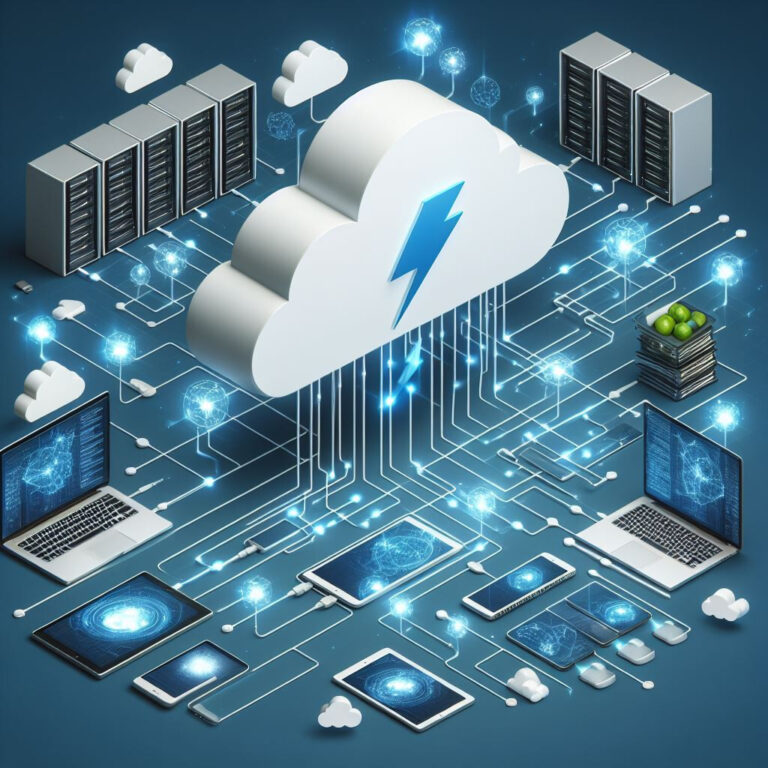Table of Contents
Cloud Computing Types, Cloud Computing Service Models
Cloud computing is emerging as a revolutionary concept in the rapidly developing technology environment, changing the way businesses manage and use cloud computing service models and digital resources. Understanding the nuances and core technologies of cloud computing is crucial for effectively advancing in the digital age.
Cloud Computing Types: Public Cloud
The public cloud refers to a computing environment where cloud resources such as servers and storage are owned and operated by third-party providers and are accessible to the general public over the internet. Organizations benefit from public cloud services by accessing cost-effective, scalable infrastructure without the need for upfront investment in hardware or maintenance.
Private Cloud
A private cloud infrastructure is dedicated to a single organization and offers advanced control, security, and customization options compared to public cloud environments. Businesses can tailor private cloud deployments to meet specific compliance, performance, and data privacy requirements by hosting resources in-house or through a third-party provider.
Hybrid Cloud
Hybrid cloud combines elements of both public and private cloud models, allowing organizations to seamlessly orchestrate workloads across multiple environments. With a hybrid cloud architecture, businesses can leverage the scalability and cost-effectiveness of the public cloud for non-sensitive workloads, while keeping mission-critical applications and data in-house or in a private cloud for enhanced security and control.
Cloud Computing Service Models
Infrastructure as a Service (IaaS) allows users to rent virtualized computing resources such as servers, storage, and networking on a pay-as-you-go basis from a cloud provider. IaaS offerings provide organizations with the flexibility to dynamically scale resources, reducing the need for upfront capital expenditure and the burden of infrastructure management.
Platform as a Service (PaaS) Platform as a Service (PaaS) provides a complete development and deployment environment in the cloud, enabling developers to create, test, and deploy applications without the complexity of managing the underlying infrastructure. PaaS solutions streamline the application development lifecycle, enabling faster market entry and more innovation.
Software as a Service (SaaS) Software as a Service (SaaS) offers ready-to-use software applications over the internet on a subscription basis. From productivity tools like email and collaboration suites to enterprise applications like CRM and ERP software, SaaS offerings eliminate the need for installation, maintenance, and software updates while meeting various business needs.
Core Technologies of Cloud Computing, Virtualization Technology
Virtualization technology abstracts physical hardware resources such as servers and storage to create independently manageable virtual instances. Virtualization separates computing, storage, and networking from the underlying hardware, optimizing resource usage, enhancing scalability, and enabling efficient workload management in cloud environments.
Automation
Automation plays a vital role in cloud computing, enabling organizations to simplify repetitive tasks, minimize manual intervention, and enhance operational efficiency. Through automation tools and frameworks, businesses can automate the provisioning, configuration, deployment, monitoring, and scaling of cloud resources, allowing IT teams to focus on strategic initiatives and innovation.
Scalability
Scalability is a key feature of cloud computing, allowing organizations to dynamically adjust resource capacity in response to changing demands. Whether scaling computing power vertically or distributing workloads across multiple instances horizontally, cloud scalability ensures optimal performance and resource utilization, enhancing business agility and competitive advantage.
Security
Given the critical importance of protecting sensitive data and reducing cybersecurity risks, security is paramount in cloud computing. Cloud providers implement robust security measures, including encryption, identity and access management (IAM), network security, and compliance certifications, to protect customer assets and ensure data privacy, integrity, and availability.
Cloud computing offers a transformative approach to managing and using digital resources with various types, service models, and core technologies, shaping the modern technological landscape. Organizations can harness the full potential of the cloud by understanding the intricacies of public, private, and hybrid cloud deployment models and IaaS, PaaS, and SaaS service offerings to drive innovation, accelerate growth, and achieve success.
Cloud computing is a computing model that allows businesses to access resources such as servers, storage, and networking over the internet, with these resources managed by third-party providers.
A public cloud is a computing environment where cloud resources like servers and storage are owned and operated by third-party providers and are available to the general public over the internet. Its advantages include cost-effectiveness and scalability, allowing organizations to access the IT resources they need without large upfront investments.
A private cloud refers to infrastructure dedicated to a single organization, offering advanced control, security, and customization. A hybrid cloud combines features of both public and private clouds, allowing organizations to seamlessly manage various workloads across different environments.
Infrastructure as a Service (IaaS): Allows users to rent virtualized computing resources like servers, storage, and networking on a pay-as-you-go basis. Platform as a Service (PaaS): Provides developers with an environment to build, test, and deploy applications without managing the underlying infrastructure complexities. Software as a Service (SaaS): Offers ready-to-use software applications on a subscription basis, eliminating the need for installation, maintenance, or updates.
Virtualization technology is a cornerstone of cloud computing, abstracting physical hardware resources to create independently manageable virtual instances. Automation facilitates the management of cloud resources and helps businesses enhance operational efficiency.
Cloud providers implement various security measures to protect customer data, including encryption, identity and access management (IAM), network security, and compliance certifications.






